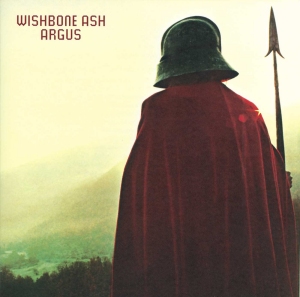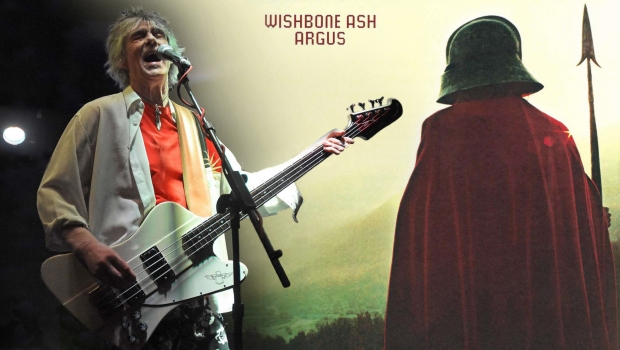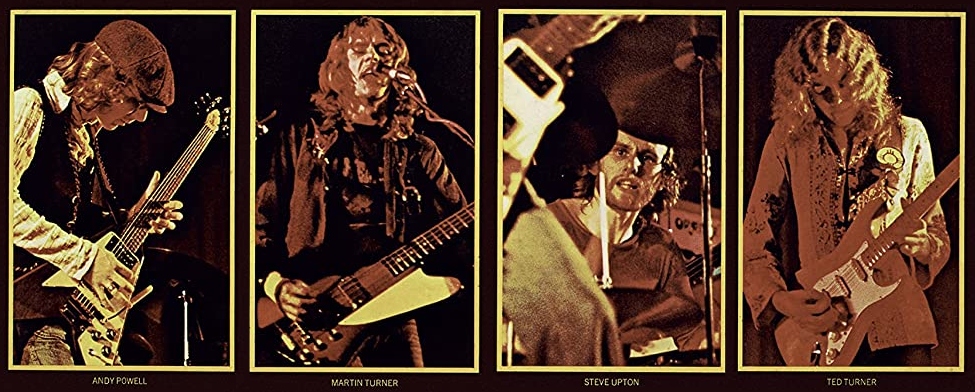By the late ’60s and early ’70s, the blues influences that had inspired the likes of The Rolling Stones, Eric Clapton and Jimmy Page were maturing into new genres of rock music, each developing their own identities with progressive rock being just one.
 On 8th May 1972 the up-and-coming Wishbone Ash released their third album, Argus. To mark the album’s 50th anniversary, TPA’s Geoff Ford revisits one of his favourite albums, with the help of Martin Turner, then the Wishbone Ash bass player, vocalist and architect of, what was to become, an all-time classic.
On 8th May 1972 the up-and-coming Wishbone Ash released their third album, Argus. To mark the album’s 50th anniversary, TPA’s Geoff Ford revisits one of his favourite albums, with the help of Martin Turner, then the Wishbone Ash bass player, vocalist and architect of, what was to become, an all-time classic.
Torquay’s Martin Turner had been active since 1963 and was joined in a trio, in 1966, by drummer Steve Upton. When Turner’s guitarist brother Glenn left the band, Martin advertised for a replacement and, torn between the two final candidates, decided to keep both Ted Turner (no relation) and Andy Powell ‘just to see what it sounds like’.
In early 1970, the newly-named Wishbone Ash opened on tour for Deep Purple, whose guitarist Ritchie Blackmore recommended them to producer Derek Lawrence and Decca / MCA Records. Wishbone Ash’s eponymous debut album was released in December 1970 followed by Pilgrimage a year later. These early albums showed a host of influences including prog, jazz and folk, an interesting mix coupled with some early experiments with the use of twin lead guitars.
1972 became a massive year in rock and prog and, on 8th May, Wishbone Ash released Argus, which would give them their highest UK Album Chart placing, at number 3. The twin lead guitars of Andy Powell and Ted Turner on this album would define the Wishbone Ash sound and prove a major influence for many bands that followed, including Thin Lizzy and Iron Maiden. The album was voted by the readers of Sounds as the ‘best rock album of the year’ and Top British Album in Melody Maker.
I never have tired of listening to Wishbone Ash albums, particularly Argus. It always sounds so fresh, I told Martin when we spoke as the 50th anniversary of Argus approached.
“Yes,” he agreed. “The Argus album was probably the most popular one. Most music from the early ’70s has a knack of sounding really dated when you play it nowadays. Strangely that doesn’t, it has a lovely vitality to it.”
Martin went on to tell me how the Wishbone Ash signature twin-guitar sound came about.
“People always think of it as two guitar players playing together but it didn’t happen that way at all. It was always a concept, from day one, to have two guitar players together, rather than fighting each other.
“I grew up on classical music and I can sing what is described as pseudo-classical melody fairly easily. We could sing that, which we did on occasion, and then do a harmony to it. When you work it out on guitar, which sometimes can be tricky, it’s not natural fingering like when it’s sung. Then you sing the harmony which you transpose onto the other guitar. Moaning all the way, they are, that it’s really awkward. ‘Come on, persevere!’ and you get there eventually, put some bends in and it’s just a very identifiable sound.
“It’s rich in melody, that’s the important thing. If you were composing that kind of stuff on guitar, it wouldn’t be the same. It’s a bit of a painful process but we realised very quickly, in the early days of the band, that it gave us a very recognisable sound, which is always good.”
Argus is often considered to be a concept album with a Mediaeval theme, as suggested by the warrior figure on the cover artwork, but it was more of an album of two sides as the first deals with a more contemporary theme of reflections of one’s own life.
Andy Powell’s delicate intro leads into Time Was, backed by Ted Turner’s haunting textures with Martin’s plaintive vocal reflecting a sadness, looking back, and a need for change to make a new start. A third of the way in, the track shifts gear to a more conventional rock tempo with Martin and Ted sharing the vocals. The message changes to a resolve to just get on with life and accept that you are what you are. Andy rips through some great licks as track draws to a close.
Ted takes the lead for the bluesy opening passage of Sometime World. “Sometime World is me, believe it or not, thinking about reincarnation, you don’t get too many songs on that subject,” says Martin, whose bass takes the lead for the second passage, demonstrating the versatility within the band. Andy picks up the lead for the final, upbeat, passage with Ted playing rhythm lines.
Sometime World, possibly more than any other track, demonstrates the differing guitar styles within the band. Ted Turner, and his rock-staple Fender Stratocaster, was very much rooted in the classic British blues tradition of Clapton, Page and Peter Green. He was also a great exponent of slide techniques and was once recognised as one of Rolling Stone‘s ‘Top Twenty Rock Guitarists of All Time’.
Martin Turner’s Gibson Thunderbird bass provides a rock-steady foundation over which the two leads can play but, when required, adds a lyrical third guitar as a striking contrast.
By way of contrast to Ted Turner, Andy Powell is the flashier of the guitar leads. I mean this, not in a condescending way, as both played a vital part in the overall sound of Wishbone Ash, but Andy would rip though some incredible flourishes. Visually, too, Andy looked the part with his distinctive Gibson Flying V.
The most commercial track is Blowin’ Free which features Andy’s up-tempo lead underpinned by Martin’s strong bass riff. Ted adds a quiet, soulful passage, mid-song and subtle slide guitar before the final licks.
“Some songs are very conscious of real-life experience,” says Martin, “usually involving emotional turmoil. In the case of Blowin’ Free, it’s very up. It’s a lovely anthemic ode to love.
“I had the idea for Blowin’ Free around 1965 or ’66. I met a Swedish girl in Torquay, loads of Swedish students used to come to Torquay every summer on an exchange. This one girl, Annalina, was like a healthy tennis player-cum-horseback rider, her daddy was a professor and so on, the polar opposite to me!
“I was a grimy little rock and roll rat, diving in and out of clubs, staying up till 2 or 3 in the morning. How we got together I don’t know! But we were young, spending time with each other. One day we sat in a car on Dartmoor, just watching a thunder storm roll down through the valley. We must have been sat there for the best part of an hour and never said a word.
“Finally, I said ‘Do you mind if I kiss you?’ or something like that, and she said ‘You can try!’, which is actually in the song.
“I had the idea for the mood and the theme of the song, I had written a few of the lyrics and I knew the shuffle rhythm that I wanted to use, along the lines of an old hippie tune by Steve Miller called Children of the Future.
“I tried to explain it to Ted and Andy, this kind of hammer-on technique in the key of D, a shuffle rhythm, and eventually they came up with the intro and we knocked the chords together and bingo! It was born, finally, after several years.
“Very often that’s the way it is, you have the ideas, the little visions, and you store them and write bits down.
“With Blowin’ Free, for instance, we tried to record that a couple of times and it just didn’t work. It was lethargic. ‘Now guys, come on! This tune is a celebration of young love, it’s got to really kick-arse! Give it some energy.’
“And, finally on the Argus album… Listen to the bass on that, it’s so pushy. It’s like me saying, ‘Come on, you will work!’
“The ironic thing was I thought it sounded really good and one day the producer, Derek Lawrence, said ‘Here, Mart, this tune, Blowin’ Free. We’ve been chatting about it and all the other material is quite serious and this is a bit fluffy and poppy. Maybe it belongs on another album?’
“I’m like ‘No friggin’ way!” Martin almost leaps out of his chair as he relives the moment. “It needs to be on this album precisely because it is different! If it’s all like that, it’s going to be boring, one dimensional. It needs some balance!’
“I had to fight for that to be on the album and, thank God, it was.
“It’s probably the closest thing to a single that Wishbone ever came. The BBC even asked us to go and perform it on Top of the Pops, which I wasn’t crazy about. We apologised and made some excuse about having a gig in Belgium. Most bands would have cancelled the gig and done Top of the Pops.”
The Mediaeval-themed concept takes up the whole of the second half of the album. Ted takes the heavier, bluesy lead on The King Will Come with the intro describing the sound of troops approaching battle. This is the heaviest track on the album and features some tremendous, heavy bass lines from Martin, a great canvass for Ted’s pedal effects in his mid-track solo. The tight rhythm section is completed by drummer Steve Upton, who is outstanding throughout the album and here adds an atmospheric military beat on his snare drum.
“The King Will Come is almost straight out of the bible,” Martin says. “It’s not me preaching, it’s me just pondering a religious concept with which I neither agree nor disagree, I’m just putting it out there. Unusually, because I got stuck after I had written the first verse and the chorus, which said it all, really, I couldn’t come up with anything for a second verse.
“I asked Steve Upton to help me out and he came up with ‘The chequer board of nights and days’, which I think comes from a Muslim book by the prophet Omar Khayyám. So, it is a multi-faith song.”
Leaf and Stream is the quietest track on Argus, with Andy’s lead interweaving with Ted’s delicate counter melody.
“Steve wrote the lyrics for Leaf and Stream based on a song that I’d written for the second album,” said Martin. “We edited out the vocal and just used it as an instrumental (Alone) but it was a very similar lyric, sitting by the side of the stream contemplating life. Steve did a great job and it’s a really lovely track.”
Side two of the (original vinyl) album would become a feature of Wishbone Ash’s live gigs, albeit without Leaf and Stream, for many years, focusing on the Mediaeval-rock trilogy.
Andy and Ted share the guitar lead on Warrior over Martin’s restrained bass. Here is one of the most powerful rock tracks in the entire Wishbone Ash back catalogue.
“With the Argus material, in particular, there were big themes that I’d been pondering for quite a long time and meant to deal with. Warrior is about men, dictators and power-mongers making war and harnessing the energy of young men. That’s been going on since the beginning of time.”
Throw Down the Sword brings the Argus saga to a wonderfully glorious conclusion. “I wrote Throw Down the Sword as a reaction to Warrior so people didn’t just think ‘Oh, this guy is advocating war,’ to give it a balance,” Martin explains. “It is almost a hymn like when I was a young lad in the church choir, that’s a nice tune.”
Andy takes principal lead for the beginning of the track but the interweaving of Andy and Ted, through the latter stages, is something to behold, quite majestic, as here was a band at the very peak of its powers.
“It was like giving birth,” Martin concluded. “I had put my heart and soul into that album and, when I finally heard the play-back in the control room, it was such a huge relief it sounded magnificent, like I wanted it to sound and, I couldn’t stop myself, it actually made me cry.”
TRACK LISTING
Side One
01. Time Was (9:42)
02. Sometime World (6:55)
03. Blowin’ Free (5:17)
Side Two
01. The King Will Come (7:06)
02. Leaf and Stream (3:55)
03. Warrior (5:53)
04. Throw Down the Sword (5:55)
Total Time – 44:43
MUSICIANS
Martin Turner – Bass Guitar, Vocals
Andy Powell – Lead (all tracks except 4), Harmony Lead, Rhythm & Acoustic Guitars, Vocals
Ted Turner – Lead (tracks 2, 3, 4, 6), Slide (track 3), Harmony Lead, Rhythm & Acoustic Guitars, Vocals
Steve Upton – Drums (all tracks except 5), Percussion
~ With:
John Tout – Organ (Throw Down the Sword)
ADDITIONAL INFO
Record Label: Decca
Catalogue#: LP 75437
Country of Origin: U.K.
Date of Release: 8th May 1972
Argus was produced by Derek Lawrence who produced the first three albums for Deep Purple and the first Wishbone Ash albums, returning for No Smoke Without Fire in 1978.
Argus was engineered by Martin Birch, engineer of the early Fleetwood Mac, Deep Purple and the first three Wishbone Ash albums before he went on to produce/engineer Rainbow, Whitesnake, Iron Maiden and many more.
The cover was designed by Hipgnosis.
Recorded in January 1972 at De Lane Lea Studios, Kingsway, Holborn, London, Argus was released on 8th May 1972 as Decca LP 75437. Argus entered the UK Album Chart the following week at number 3 and remained in the chart for 20 weeks, achieving a Gold disc for the band.
Andy Powell remains as the only original member of Wishbone Ash while Martin Turner enjoys touring with his own Martin Turner’s Wishbone Ash band.
Live photographs by Geoff Ford.
LINKS
Martin Turner – Website | Facebook | Twitter
Andy Powell – Website | Facebook | Twitter




